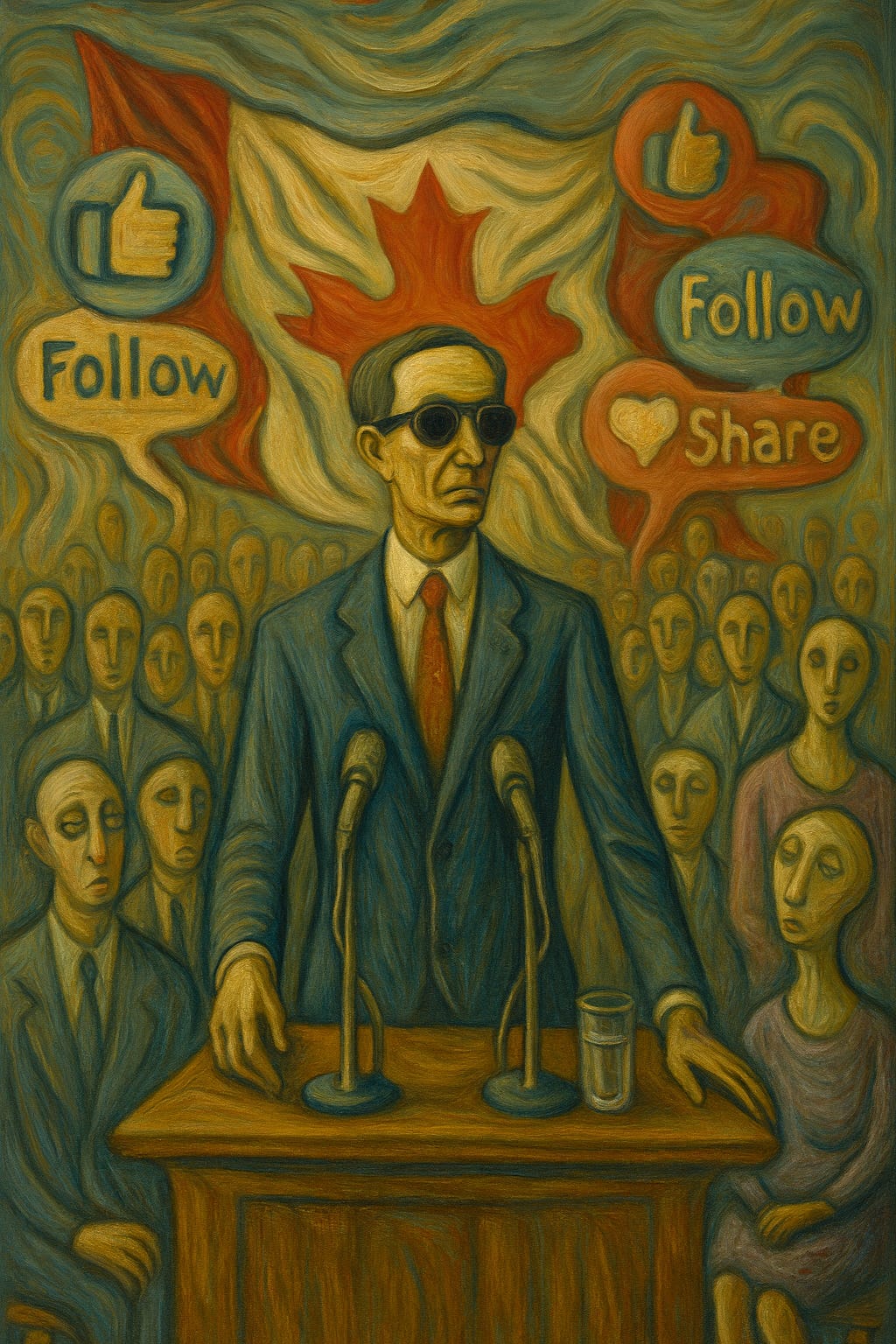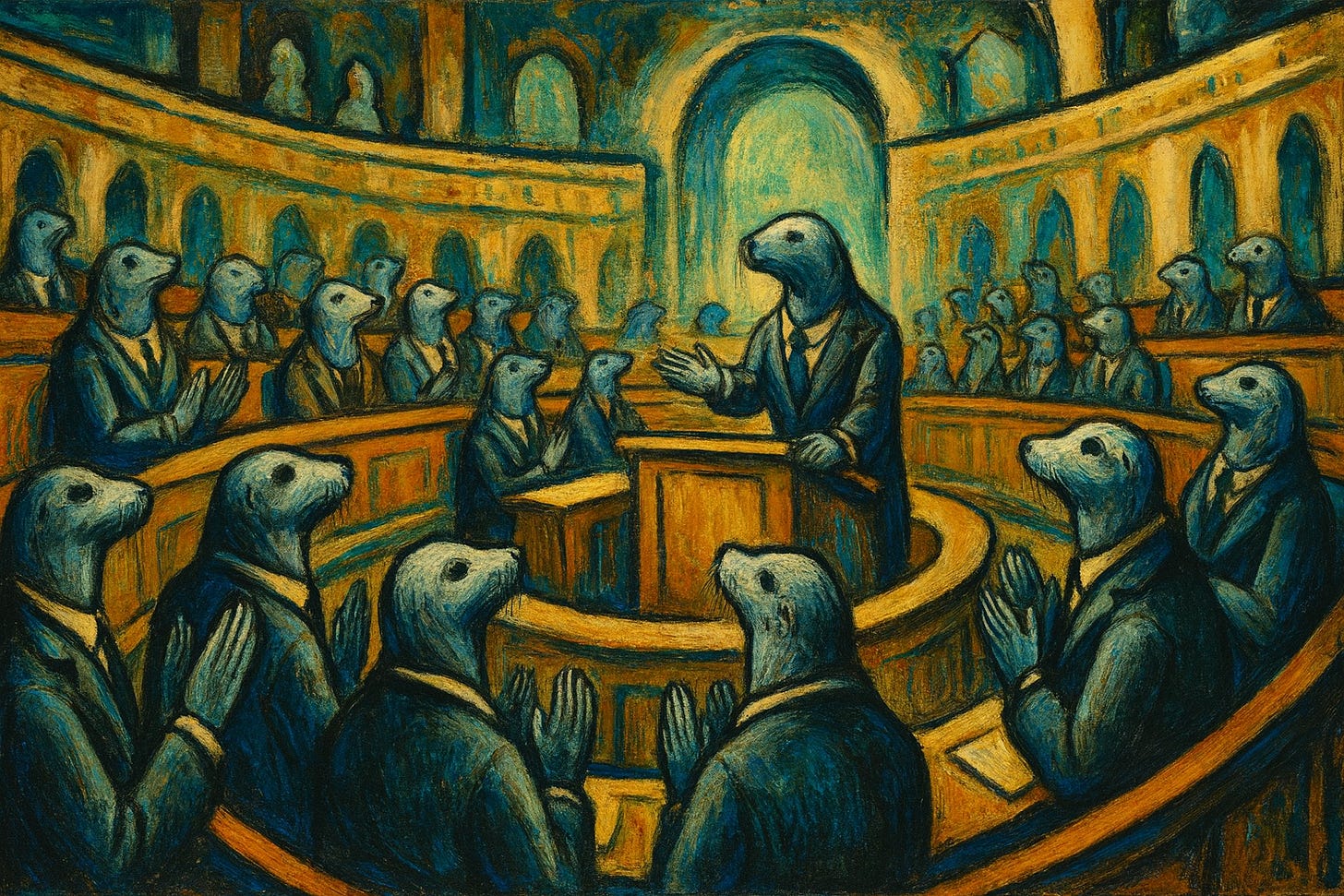The Selfie Ballot: Democracy in the Age of the Influencer
(I hadn't heard of most of the top ten influencers but beware the Influencer-Politician Leviathan.)
If you believe in free speech, here’s the bad news: it isn’t actually free. It costs $5 a month. That’s less than the latte you complain about, less than the Netflix shows you’ll never watch, and far cheaper than your last regrettable bar tab.
For that, you get three essays a week, open comments, and the satisfaction of knowing you’re funding uncensored writing in a world addicted to censorship. Everyone says, “It’s just the price of a cup of coffee.” Fine.
But here’s the pitch: give me your coffee money and I’ll hand you something stronger—essays with bite, arguments with teeth, and the freedom to say what others won’t.
Subscribe today. Because silence is free—and it’s worth exactly what you paid for it.
“They traded the ballot for a mirror and mistook reflection for rule.”
Whether people vote is not the only issue. The priests of punditry will clutch their pearls over “voter apathy,” as if participation alone were the sacrament of democracy. Yet there is something far worse than not voting: voting stupidly, voting vainly, voting as if you were choosing an influencer to follow rather than a leader to trust.
In Canada, the percentage of the population voting federally has declined over the last forty years—from 75% in 1984 to just above 60% in the most recent federal election. And yes, the commentators duly sigh and light another scented candle for “democratic engagement.”
But before we cast our ballots, by what criteria do we decide? What lodestar governs our choice? If our standards are shallow, sentimental, or tribal, then our decline is not political but civilizational. What hope can there be for moral and competent leadership when the electorate chooses like adolescents choosing a TikTok crush?
The Cult of the Influencer
According to CBS News, 86 percent of children now aspire to the same career: social media influencer. The word influence, once the prerogative of Plato and Shakespeare, has been degraded to mean “getting likes from strangers.” It is the most pathetic form of ambition in human history.
And now we elect people who mirror that pathology. Our politicians are no longer representatives of conscience or intellect—they are avatars of our narcissism. The ballot box has become a mirror, and we vote for the reflection that flatters us most.
We lament a would-be Prime Minister whose chief credential is a halo of self-regard burnished in boardrooms and on conference stages. Mark Carney, the banker-priest of globalism, speaks in the language of piety but thinks in derivatives. He is the sort of man who mistakes the G7 for Mount Sinai and imagines carbon credits will redeem mankind. Yet he photographs beautifully: that silvered calm, that technocratic charm—the influencer’s aura of serene superiority.
The opposition leader, too, has little to recommend him beyond professional politicking. And Mr Singh, a walking brand partnership between grievance and Gucci, appears to have been raised with more money than calluses. One doubts whether any of the three could start a lawnmower, let alone a country.
But perhaps that is the point. Real-world experience is now a liability. Why sweat, toil, or think when you can pose, emote, and go viral?
The Politician as Influencer
Public service—an idea once spoken with something approaching reverence—has been replaced by the performance of “caring.” Members of Parliament are handsomely paid to sit in committee rooms reciting pre-approved platitudes like Gregorian chants of mediocrity. The only thrill left is in the pursuit of attention, and attention, that cruel and fleeting currency, is the new blood of politics.
What kind of person wants to be an MP now? Only those intoxicated by the theatre of self-regard. The system rewards the clapping seal, the grinning selfie-addict, the creature who will trade integrity for applause and conscience for clicks.
You don’t need to read or write; merely to emote. And God help us if the next great populist is not a general or philosopher but the winner of a hot-dog-eating contest who can cry on cue. Someone will find them, groom them, and market them as “authentic.” We will vote for them eagerly—because they seem “real.”
We already have journalists who have become finance ministers, whose only fiscal experience was bankrupting a newsroom, yet we pretend to be surprised when the ledgers burn. We crave authenticity so much that we mistake the performance of sincerity for the real thing.
The Humility Hustle
Influencer politicians cloak themselves in counterfeit humility—“broken servants,” “humble vessels,” “Mary Magdalene with a BlackBerry.” Yet the true Magdalene did not stay in six-thousand-shekel hotels. Our modern penitents are as ostentatiously humble as televangelists in silk cassocks, weeping on cue for the cameras before boarding their private jets.
Ask yourself: what other motivation remains? Power, yes—but it is power as performance. Their reward is not to govern but to trend.
And so, MPs vote with their parties ninety-nine-point-six percent of the time, a numerical proof that they have minds only in the biological sense. Parliament today reminds me of my two West Highland terriers, Toby and Malibu. One growls, the other barks, both fling themselves at the patio door in operatic outrage at some distant squirrel. They snarl, they paw, they pant, and then, ten seconds later, they’re asleep again—dreaming perhaps of kibble and relevance.
The Attention Economy of Power
Rona Ambrose didn’t run for the Conservative leadership. Who can blame her? Why plunge into a snake pit where the chief qualification is shamelessness? The oxygen of politics is attention, and attention is precisely what the influencer class craves.
Influencers do not sell ideas—they sell themselves. Their entire enterprise is to monetise envy. Their smiles are commercial properties—their souls, leased to algorithms. And now the same grotesque economy governs democracy.
To be “authentic” has become a marketing posture, taught on the first day of Influencer Acting 101. Authenticity, my God!—the most fraudulent word in the modern lexicon. It means nothing more than “artfully fake.” Influencers are friends you never meet, confessors who never listen, priests of a cult that worships your data.
And our voters? They respond exactly as consumers do. They form parasocial bonds—one-way emotional attachments—with the politicians who most resemble their own curated selves. They vote not for competence but for companionship. Their “leader” is a lifestyle brand.
Thus, the parasitic circle closes: voters demand feelings; politicians supply them. Substance dies of neglect.
The Spectacle of Leadership
It should come as no surprise that Mark Carney exudes the aura of a man rehearsing his own canonisation—Saint Mark of the Markets, patron saint of Davos and the selfie summit. His politics are immaculate; his conscience, investment-grade. He glides from podium to podium with the sanctimonious grace of a yoga instructor discussing monetary policy.
Nor should we be shocked that former NDP leader Mr Singh flaunts his Omega watches and luxury cars while lamenting inequality. The working class can eat cake—so long as it’s branded vegan.
Influencers are not content to advertise products; they advertise themselves as products. Their followers do not aspire to learn from them, but to become them. That is the horror. They are not false prophets—they are mirrors, and people will pay dearly to see themselves reflected in delusion.
Influencer politicians are no different. They are simulacra of leadership, holograms projected by marketing departments, elected by people who no longer wish to be citizens but fans.
The Triumph of Jealousy
Jealousy and envy—the twin gargoyles of social media—drive the entire apparatus. They are no longer sins; they are strategies. Iago would have wept with pride. The influencer’s task is to evoke both desire and resentment in equal measure, making you both hate and want to be them simultaneously.
And now we vote that way. We vote for those who outrage us most deliciously. We do not follow the candidate who speaks for us, but the one who feels for us—who performs emotion more convincingly than we can. Politics has become a feedback loop of grievance and mimicry.
The New Criteria of the Herd
Do voters vote on whims, on feelings, on trivialities? Of course they do. But the real tragedy is that these are the only tools left. Reading, reasoning, comparison, and memory have all been outsourced to the glowing slab in our hands. The electorate no longer consults principles but feeds on impressions—snippets, slogans, moods.
Politics has become branding, and the voter is now a consumer of vibes.
On the Left, we see Carney’s cult built on urbane charm, moral posturing, and that ineffable Davos “vibe.” On the Right, we see the Reputins—Republicans who adore a murderous kleptocrat because he photographs well on a horse. Trump’s secret was never ideology but theatrics: he could embody resentment as performance art.
The Millennial Democracy
Millennials—the first generation raised entirely within the digital aquarium—are now the largest voting bloc. They have been conditioned not to read but to scroll, not to deliberate but to react. They will not so much choose their leaders as follow them.
The influencer politician, like his audience, has no depth—only reach. He has no character—only content. And the tragedy is not his shallowness, but ours.
Culture, that vast and lumbering beast, cannot easily be turned. It moves with the dull inevitability of a glacier, grinding everything solid beneath its moral weightlessness. And so our democracy drifts forward—rudderless, tribal, hypnotised by its own reflection.
On the deck of this great, listing ship, our influencer captains pose for selfies at sunset, chin up, teeth glinting, followers soaring. They never look back at the wreckage in their wake—the debris of intellect, truth, and seriousness.
And when the ship finally sinks, as all cults of vanity must, they will film themselves doing it.
If you value this work, consider leaving a tip. It’s cheaper than therapy, less pious than public broadcasting, and the only censorship here is my bad taste. On second thought, it’s bad therapy.










Paul, interesting article. Those who blindly vote for a party label pimp (aka politician) seem to have a herd mentality and, most likely, an irrational fear of not belonging. Whereas the folks who haven’t developed their own personality through life experiences have become iconoclasts (aka influencer fodder). Both blindly follow without understanding what they’re following. Their takeaway is a sense of self fulfillment (which most certainly causes painful bloating and flatulence). Their intellectual overlords are demagogues having no allegiances other than to their own ego. Those who don’t fit into either category are a diminishing minority who read the heretical essays of Leviathan slayers like Finlayson (representing Canada) and Hammock (representing US), both available on Substack.